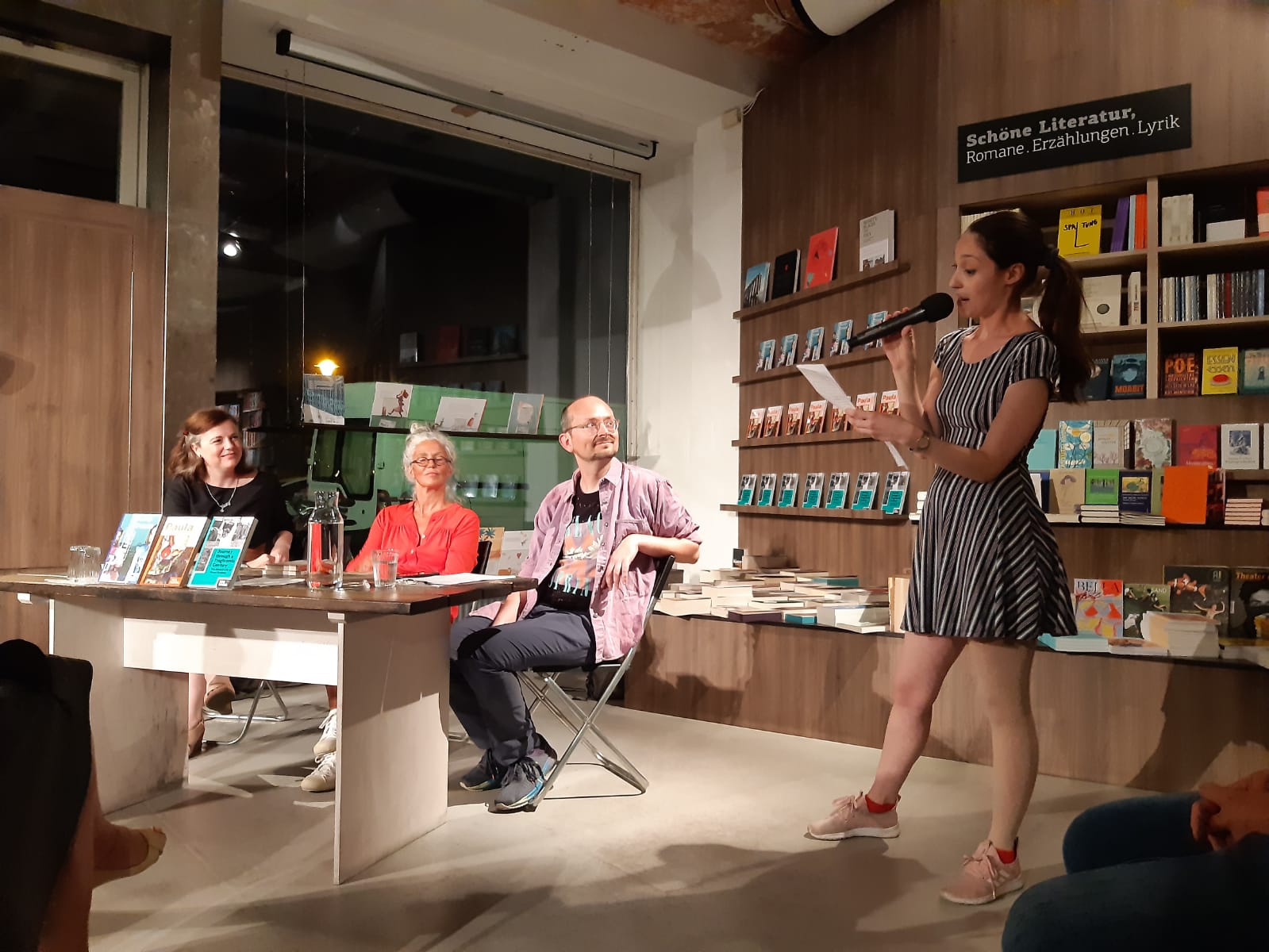
“[A] Berlin-based publisher of English-language books – what a bizarre idea.” So states a tongue-in-cheek entry in the Translator’s Glossary to Journey through a Tragicomic Century (Reise durch ein tragikomisches Jahrhundert by Francis Nenik), one of the first three titles to be published by the newly launched V&Q Books. Its appearance there gives an idea of some of the stand-out features of V&Q Books: interesting content, bold translation choices, and a good dash of humour.
V&Q Books is itself the new English-language imprint of the indie publishing house Voland & Quist Verlag. Its aim is to bring “remarkable writing from Germany” to a UK and Irish audience, and its first three titles were released this month. The venture is spearheaded by Katy Derbyshire, an experienced literary translator. She has been active on the translation scene for many years, translating authors such as Clemens Meyer and Christa Wolf and taking an instrumental role in launching the Warwick Prize for Women in Translation, and is now taking the step into publishing.
The idea stemmed from a desire to do something that gave her more control over her own work, and then became reality after mentioning it to Voland & Quist at Frankfurt Book Fair two years ago. The concept suits Voland & Quist’s focus on less mainstream literature, as Karina Fenner, one of the heads of the company, makes clear:
For us, thinking outside the box has always been very important … and we have a soft spot for translations of central and eastern European literature. At first, we found Katy Derbyshire’s idea of English-language translations crazy, and then crazily good: and now we have this exciting imprint, an enthusiastic colleague, and some wonderful authors.
That enthusiasm was also clearly present when we talked to Katy Derbyshire about her experiences of running the venture and producing the books. In addition to her, the core V&Q Books team includes six people who mostly work from their office in Berlin, handling the day-to-day details from accounts to cover design. Derbyshire describes her role as a bit of everything, including “everything that needs to be done in English”, whether that’s communicating with translators or holding discussions with their freelancer publicist in London – and, of course, translation.

She translated two of the first three books herself, including Journey through a Tragicomic Century, which retells the fascinating life of the forgotten writer Hasso Grabner. The other two titles are Paula by Sandra Hoffmann, a fictionalised account of the author’s relationship to her grandmother; and Daughters (Töchter, in German) by Lucy Fricke (trans. Sinéad Crowe), a darkly funny novel about two women on a road trip dealing with difficult fathers.
“Ownership on the part of the translator, if you will”1
The first three titles from V&Q Books are all translated from German, although the aim is eventually to include books from other languages, and English-language literature written in Germany. When it came to the choice of titles, Derbyshire says that there were a number of factors at play:
They have to work well as a catalogue; you don’t want two very similar books, and you don’t want too many similar authors and backgrounds or styles … We chose books that would make a bit of a splash, but it also depended on which funding we could get.
The first run, then, covers fiction, narrative non-fiction and autofiction. The impetus came largely from Derbyshire, with some input from Voland & Quist. Paula, for example, had been on her radar for a while; she had previously tried to find a UK publisher for a translation, without success. Add in the issue of obtaining the rights and looking for gaps in the market, and you have the first selection.
To talk about how these books work as translations, let’s come back to that initial quotation from the Translator’s Glossary. It’s an addendum to an entry on the Communist writer Bruno Apitz:
His key work, the 1958 novel Naked Among Wolves, was set in Buchenwald concentration camp and translated into 30 languages. The English version (tr. Edith Anderson) was published by Seven Seas, a Berlin-based publisher of English-language books – what a bizarre idea.
This is Katy Derbyshire’s voice, which comes through clearly and unapologetically throughout the glossary. Here, for example, is the entry on Rainer Maria Rilke: “Dead white man, German poet. Liked big cats.” Another entry includes a comment about being “overcome with awe” when sitting behind the author Volker Braun, while the one about the Russian writer Aleksandr Solzhenitsyn details how her father was once mistaken for him. Derbyshire’s position as head of the imprint gives her the freedom to push this radical kind of addition: a third voice for the book, one that fits in comfortably alongside the wonderfully strange tone of the main text and the final authorial section describing how Nenik chose the subject matter. It provides her with the confidence to not only include the glossary at all, but to do so in a bold way that engages with the text rather than standing back from it. According to Derbyshire, this is the joyful thing about being a publisher translator:
I have a bit more freedom to make decisions. The glossary would have taken quite a lot of explaining!
“The author and I”2
This conjunction of translator and publisher adds an edge of interest to each of the books in the catalogue. Paula, for example, which was at the top of Derbyshire’s wish list when it came to discussing books with Voland & Quist, contains several tricky translational elements. In the book’s Translator’s Note, Derbyshire talks about her dissatisfaction with the idea of “untranslatable” words and books:
[They] demand creative translations, reworkings, bold steps. Ownership on the part of the translator, if you will.
You can see this confidence in the very first lines of the translation of Paula:
Schweigen ist anders als still sein.We have a word in German: schweigen. It means deliberately remaining silent; it is different merely being quiet.
Adding an entirely new first line to the book is something of a drastic intervention: one, however, that provides a sustainable solution to the problem of translating the word “schweigen”, of such central importance to the whole work. It is also one that comes with the approval of Sandra Hoffmann, who Derbyshire consulted during the translation process – a way of ensuring that both the author and the translator/publisher are happy with changes that push the conventional boundaries of commercial translation.
“[The] uproarious side of German literature”3
That’s what Sinéad Crowe, who translated the third and final book of the initial run (Daughters by Lucy Fricke), emphasises in her Translator’s Note: the desire to share the witty side of German literature with a UK and Irish audience, who are far more used to encountering the dour and earnest edges of the German literary scene. The desire to fill this niche is something Derbyshire also emphasises, saying it is “something that has been annoying me for many years; I think there is more humour in German writing than is often acknowledged.” She also has a preference for books with a sense of place (though not specifically Germany):
I feel like translations often need one. They need to have a specific setting, because otherwise why would we bother translating it, especially into English, where so little is translated in the first place.
Enlarge

These traits are very much evident across the three books, from the wittily narrated road trip in Daughters to the absurdity woven through the travels of Hasso Grabner in Journey through a Tragicomic Century.
When taken as a set, the three books make a strong showing. They work well as a catalogue, each unmistakably individual but sharing several common threads: a sense of place, a sense of humour, potentially difficult yet interesting translation choices. The more visible presence of the translators adds a richness to the books, a confidence that does not detract or distract from the strengths of the originals. If all goes well, they will hit the mark with their target audience in the UK and Ireland – and we can then look forward to seeing what V&Q Books produces next.


